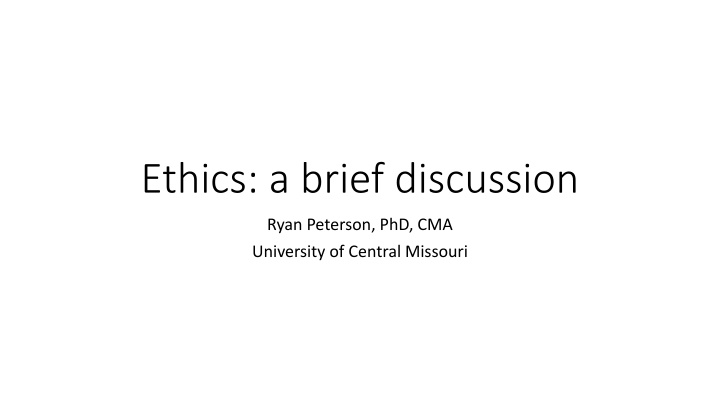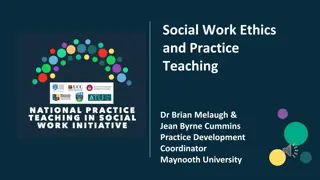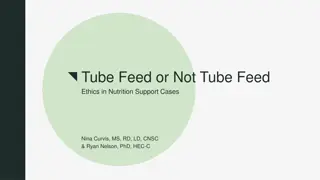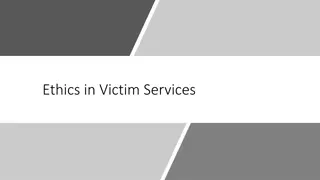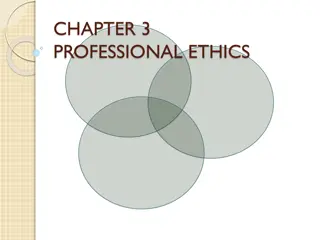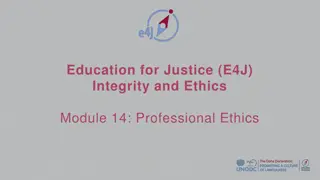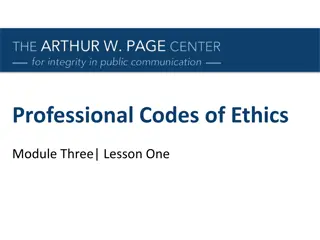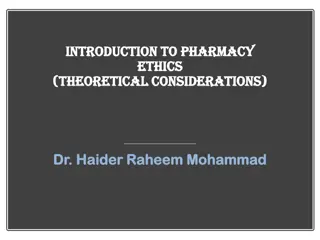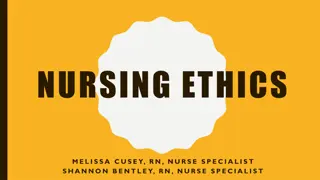Importance of Ethics in Professional Practice
Ethics play a crucial role in guiding behavior and decision-making in professional settings. While laws set certain standards, ethics go beyond mere legality to define what is morally acceptable. Teaching ethics is essential, as shown by research in various fields such as public accounting. Codes of ethics, like those from AICPA and IMA, set high standards for professional conduct, emphasizing principles like honesty, fairness, and responsibility.
Download Presentation

Please find below an Image/Link to download the presentation.
The content on the website is provided AS IS for your information and personal use only. It may not be sold, licensed, or shared on other websites without obtaining consent from the author.If you encounter any issues during the download, it is possible that the publisher has removed the file from their server.
You are allowed to download the files provided on this website for personal or commercial use, subject to the condition that they are used lawfully. All files are the property of their respective owners.
The content on the website is provided AS IS for your information and personal use only. It may not be sold, licensed, or shared on other websites without obtaining consent from the author.
E N D
Presentation Transcript
Ethics: a brief discussion Ryan Peterson, PhD, CMA University of Central Missouri
What is ethics? What is ethics? moral principles that govern a person's behavior or the conducting of an activity (what is acceptable) Do laws define ethics? Not exactly
Disclaimer: Im no expert I don t subscribe to a code of ethics. A code of ethics only makes it easier for people like me to take advantage of you. https://www.youtube.com/watch?v=o0tUZ6lmnls
Can ethics be taught? Bobek, et al. (2017, BRIA) Ethical environment of CPA public accounting firms are perceived as stronger than CPAs working in industry Ethical environment of big 4 is perceived to be more ethical than non-big 4. Lu and Lin (2014) Perceptions are positively associated with ethical behavior Mayer et al. (2010) Perceptions are negatively associated with misconduct
Can ethics be taught? Ethics & Compliance Institute (The State of Ethics & Compliance in the Workplace report)
But why does it matter? ''What about us?'' said Sandra Stone, 51, an executive assistant who lost a $49,000-a-year job and Enron stock rewards that were valued at $150,000 at one point.
So it matters how do we teach it? How do we teach it?
AICPA Code of Professional Conduct By accepting membership,a certified public accountant assumes an obligation of self-discipline above and beyond the requirements of laws and regulations.
IMA Statement of Ethical Professional Practice Members of IMA shall behave ethically. A commitment to ethical professional practice includes overarching principles that express our values and standards that guide member conduct. Principles Honesty, Fairness, Objectivity, and Responsibility Standards Competence, Confidentiality, Integrity, and Credibility
Is a didactic approach effective? Reading a code of ethics to students is quick They can memorize it fairly easily It has little to no effect on their decision-making
Alternatives? Use examples Personal experience Discuss personal values (wealth, civic duty, integrity, etc) Paying taxes, voting, jury duty, etc) Use smaller felonies than larger Controversy is good for discussion and discussion is good for exploring ethics https://www.youtube.com/watch?v=jy8b6QehChc
Giving Voice to Values https://youtu.be/U9t4KQYcO6M
To Break Ships or Not to Break Ships Explosion at Pakistan Ship Breaking Yard Kills More than 10 People Us Companies are some of the companies outsourcing this work US ship breaking operations are safe and profitable, largely driven by contracts with the US military
To Break Ships or Not to Break Ships - summary A long established US boat breaking company experienced losses after many successful years Hired a new CFO who expanded the company to recycling and exported the boat breaking operations to Pakistan, ship breaking name change Recycling is cyclical and experienced a downturn, causing losses, but kept afloat by outsourced ship breaking operations Ship breaking operations experience a major event that killed and injured workers CEO must decide to continue operations or risk the loss of thousands of jobs in Pakistan and the US and declare bankruptcy
To Break Ships or Not to Break Ships - Goals Students can identify the ethical dilemmas and stakeholders in a real- world case Students can identify decisions available to the decision maker and the ethical consequences of those decisions Students can suggest a course of action and support their decision by applying the IMA Statement of Ethical Professional Practice
To Break Ships or Not to Break Ships - questions Identify the ethical dilemmas presented in the case Review the IMA SEPP and discuss the standards most applicable when selecting a course of action What are the CEO s responsibilities as the CEO and chairman of the board? Discuss whether there is conflict between CEO s responsibilities to SBSRC identified in question 3 and committing to the IMA SEPP Critically evaluate the alternatives and discuss what alternative you would select if you were the CEO Develop and present a fourth alternative to the alternatives presented above
Ship breaking industry More than 800 large ships are broken up each year, the vast majority on Asian beaches. Owners can earn an extra $1M to $4M per ship (~1.6B) when selling to Asian yards via cash buyers, instead of opting for recycling yards with higher standards, says Jenssen. No one forces the industry to send ships to be dismantled there. They choose to send them Thousands of workers have been killed or maimed dismantling the world s ships
Has Ethical Behavior Changed or Improved? Ethics & Compliance Institute (The State of Ethics & Compliance in the Workplace report)
